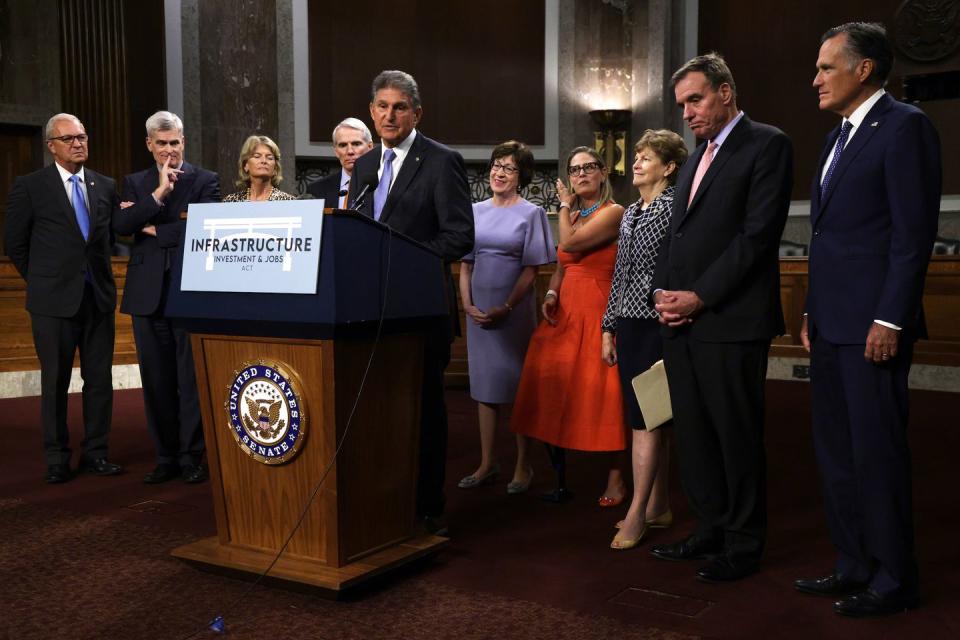What the F*ck Are These People Talking About?

It remains completely insane—abjectly nuts—that you cannot just pass a bill in the Senate with a majority of votes. The Senate is by design a starkly undemocratic body where a person who gets a couple hundred thousand citizens' votes has equal power with someone who gets millions. The chamber is currently split 50-50 between the two major-party caucuses, but the 50 Democrats and Independents represent 41.5 million more people than the 50 Republicans do. So warped is our perception of things, however, that the 50+1 votes Democrats used to pass a pandemic relief package earlier this year—they relied on the tie-breaking vote of Vice President Kamala Harris—seemed to strain democratic legitimacy. In reality, it was a means of rescuing some legitimacy, not to mention functionality, for a legislative body on the brink. A legislature that cannot respond to a crisis and deliver in a way that reflects the people's will is in big trouble.
The way that Democrats even got that done is through the process known as budget reconciliation, wherein the Senate can pass a bill with a simple majority (50+1) so long as it travels through a Rube Goldberg machine of arcane rules—the Byrd Rule being the most prominent—and generally deals with tax, spending, and debt limit issues. Whether something fits the bill for reconciliation is often in dispute. Democrats tried to include immigration reform in the bill currently under consideration and were shot down by the Parliamentarian, an unelected office whose holder is tasked with adjudicating these things. (Immigration reform is clearly a stretch for reconciliation, but also the Parliamentarian's decisions are non-binding.) Now Democrats will wait anxiously to see what else this random person will tell them they can't include in the bill, all because Democrats refuse to get rid of the filibuster, a mechanism of obstruction that, through a solid decade of abuse, has led to pretty much everything requiring 60 votes to pass. This is less of a supermajority than the filibuster used to require, and the Senate has also repeatedly carved out exceptions to the filibuster in recent years, particularly on judicial confirmations. But conservative Democrats, led by Senators Joe Manchin and Kyrsten Sinema, are clinging to this arbitrary obstacle to their own party's agenda, one that they could remove at any time.

What you may have picked up on by now is that all of this shit is completely made up and incredibly dumb. The Senate was already a body weighted grossly in favor of inaction, and thus the status quo, which tends to benefit the most powerful people in our society and relegate the concerns of the marginalized to well beyond the margins. In its current form, where the filibuster blocks most everything besides judges and Pentagon spending, it is complete farce. The Founders did not create the filibuster, or the Parliamentarian, or budget reconciliation, not that it would matter all that much if they did. We’re seeing this nonsense play out in practice with the debt ceiling. It takes 50+1 votes to raise it—and pay for bills already accrued—but 60 votes to end debate and advance to a vote. Republicans are blocking the motion to advance.
And thus we come to a point where the United States of America faces a parade of generational crises, but the most powerful legislators in the land are creating their own institutional crises to occupy their time instead. Without the filibuster, Republican senators would actually be more incentivized to cooperate: if the bill were likely to pass in some form without them, they'd be more inclined to participate in crafting a proposal they might like better. Indeed, some did collab on the Bipartisan Infrastructure Framework—a separate bill from the reconciliation proposal, running on a parallel track—but that alone is woefully inadequate to meet the problems of the moment. There's good reason to believe Republican leader Mitch McConnell and his caucus backed it in the belief they could use it to kill off the rest of the Biden administration's domestic agenda, and they might be correct in that assessment.
The current process on the larger reconciliation bill, meanwhile, has the convenience of, for someone like Senator Sinema, protecting the interests of their large donors in maintaining the status quo. It is less convenient for the rest of us, who can see the clock ticking on this planet's time as a hospitable environment for human civilization as we know it. And on the legitimacy of our elections as state-level Republicans go on the attack against voters and outcomes they find inconvenient. And for families living on the brink, where parents soon won't be able to afford to take time off work when they get sick or to take care of their newborn babies. This country has not seen robust, broad-based investment in its own people in decades. There's only been money for war and rich-person tax cuts.
There stands before the current Congress a golden opportunity to decarbonize our society and protect the franchise and build a better world for American families, and they're talking about the Byrd Rule. The nerve of these people, striding around the marble halls obsessing over nonsense like the Parliamentarian's rulings or The National Debt while the great tides of history are lashing against the city walls. None of this stuff is real, and only people who've been swimming in it too long have deceived themselves otherwise. If we get that far, our descendants will look back on all of this with horrified wonder.
You Might Also Like

